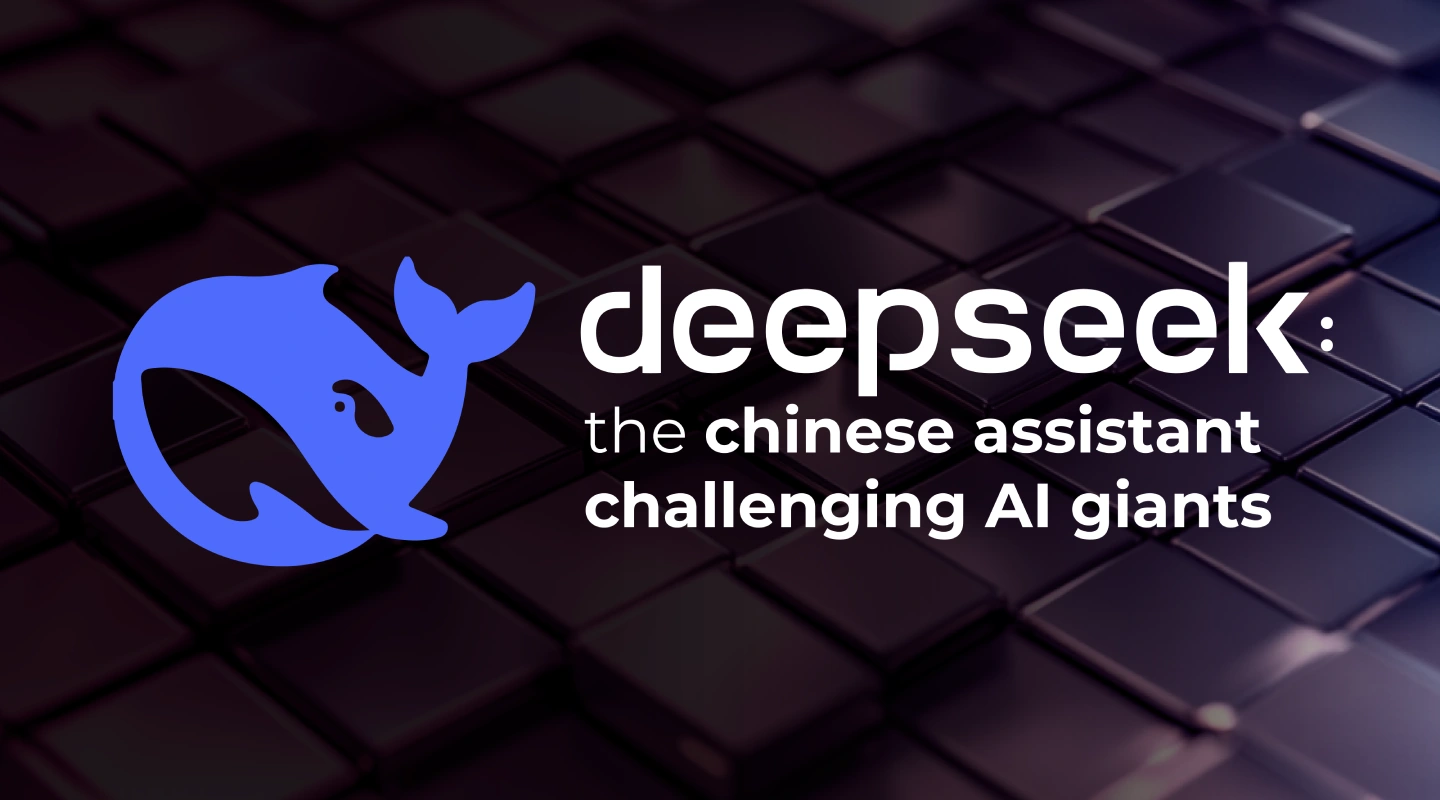DeepSeek: the chinese assistant challenging AI giants
2025-02-03T19:18:27

Some days ago, the Chinese company DeepSeek made a bold move by positioning its artificial intelligence assistant as the highest-rated free app on the U.S. App Store. Since its launch on January 10th, this assistant from China has been gaining more and more popularity, competing with similar assistants like Gemini, Copilot, and mainly ChatGPT.
Let’s better understand the reasons behind DeepSeek’s success in the market and what it can teach us about the importance of prioritizing efficiency and operability in our tech products.
DeepSeek bets on optimizing resources
DeepSeek is the name of both a Large Language Model (LLM) and the company that develops it, which is dedicated to business automation, software development, and natural language processing.
Unlike ChatGPT, its main competitor, DeepSeek is an open-source model, meaning that anyone can download it and see how it works internally. Additionally, in its browser and desktop versions, it’s completely free. It doesn’t require any subscription to use it.
So far, DeepSeek has developed two different LLMs, both of which stand out for having an impact equal to or greater than models that have been in the market longer but with a much lower cost.
DeepSeek V3: It needed only 2.788 million training hours to hit the market. DeepSeek R1: It has a 97.3% success rate in MATH-500 math tests compared to ChatGPT’s 96.4% correct answers.
Efficiency and cost optimization
One of the most important facts is the cost difference between DeepSeek V3 and ChatGPT.
While OpenAI’s product required an $80 million investment, DeepSeek had a production cost of around $5 million, according to the company itself, making it 90-95% less expensive. This was partly because DeepSeek used NVIDIA H800 chips for training, which helped reduce costs.
It’s also important to mention DeepSeek’s efficiency in terms of its parameters, the variables that determine the functioning of an AI assistant. While traditional models have 1.8 trillion parameters active all the time, DeepSeek AI only uses 37 billion at a time. Efficiency and specialization are key.
Challenges and lessons for companies
What’s happening with DeepSeek and its market disruption is not just a bold move in the entire tech sector; it’s also a huge reflection for companies, their boards, leadership teams, production teams, and technology teams.
Let’s look at the data.
- OpenAI: founded 10 years ago, has around 4,500 employees, and raised $6.6 billion in capital.
- DeepSeek: founded less than 2 years ago, has 200 employees, and developed its first language model with just $5 million.
While a tech giant like OpenAI and Anthropic has spent over $100 million just to train their AI models, a small startup from China, with only 200 employees, has built an AI system that matches GPT-4’s performance for 20 times less money, ensuring the same user-facing functionality with a more transparent proposition.
The impact of specialization
One of the most interesting and important characteristics to understand DeepSeek’s efficiency is its focus on specialization.
Similar products like ChatGPT, Gemini, and Microsoft Copilot are designed to perform tasks across multiple fields. From data analysis to report writing, these AI assistants can perform well in multiple tasks but don’t fully specialize in one area.
In contrast, DeepSeek is designed to be a much more specialized assistant than its competitors, offering high-performance models for researchers, developers, and companies that need and seek advanced tools in science and technology, all thanks to its emphasis on advanced technical tasks.
Reliability and user privacy
No one doubts that DeepSeek is a powerful and useful assistant for various tasks. However, being a technology made in the People’s Republic of China, a country known for its censorship and ideological tendencies, there are many doubts about the reliability of this tool and the use of user data.
A few days ago, Asilo Digital confirmed that DeepSeek refuses to criticize China’s president, Xi Jinping, while it has no issues doing so with Donald Trump, his U.S. counterpart. Additionally, the AI does not respond to inquiries about sensitive topics such as human rights in the country, the 1989 Tiananmen Square Massacre, Taiwan’s independence, and other issues.
On the other hand, according to DeepSeek’s own privacy policies, user-provided data is stored on servers located in the People’s Republic of China. According to the policies, DeepSeek can use all content for its associated services, but it doesn’t clarify which services we’re talking about.
DeepSeek bets on an innovative approach to maximize existing resources and, with that, generate a greater impact with a meticulous design of the parameters at play. In this way, the AI assistant manages to be on par with products like ChatGPT, which invest much more money to achieve similar results.
In this scenario, CodersLab is one of the best solutions for digital modernization and resource optimization for greater impact. We are experts in software development, engineering, research, and everything necessary for the creation, development, and iteration of products.